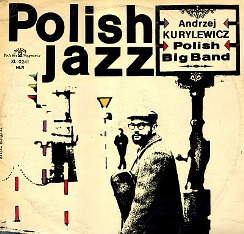Andrzej Kurylewicz & Polish Radio Big Band – Polish Jazz Vol.2 (1964)
Andrzej Kurylewicz & Polish Radio Big Band – Polish Jazz Vol.2 (1964)

1. Selektor Junior (Karolak)
2. Guma (Karolak)
3. Kocur Naukowiec (Wróblewski)
4. Piasek(Urbaniak)
5. Wszystko o Kowalskich (Wróblewski)
6. Sympatie i Antypatie (Millian)
7. Byk (Kurylewicz)
8. Ballada dla Anny (Figiel)
9. Wieczorem po Marszałkowskiej (Kacperski)
10. Lisi Krok (Karolak)
Personel:
-W. Żurkowski, Z. Przybyszewski, A. Banasiak, A. Predella, H. Rzeźniczek, saxes
-F. Kowalski, J. Grabarski, F. Górkiewicz, T. Szostak, S. Mizeracki, trumpets
-P. Zdzitowiecki, W. Kacperski, S. Kowalczyk, K. Morawski, trombones
-A. Kurylewicz, Valve Trombone
-P. Figiel, piano
-E. Dyląg, bass
-S. Walter, drums
Andrzej Kurylewicz. Composer, pianist, trumpeter, trombonist, and conductor; born on 24 November 1932 in Lviv [then Lwów in Poland], died 13 April 2007.
He learned to play the piano since he was six, at the Music School in Lviv and after the war - in 1946-50 - at the Music Institute in Gliwice and the Secondary Music School in Krakow. He was a student of Krakow's State Higher School of Music in 1950-54, studying piano with Henryk Sztompka and composition with Stanisław Wiechowicz; however, he was expelled for playing jazz (forbidden at the time). In 1954, he was a pianist with the group MM 176, and set up his own quintet a year later, which was later transformed into the Polish Radio Organ Sextet in Krakow (in existence until 1962). In 1969 Andrzej Kurylewicz debuted as a composer of film music (Powrót / Return, dir. Jerzy Passendorfer, 1959-60).
As an instrumentalist and conductor, he performed in many European countries, the United States, Canada, and Cuba. In 1964-66 he conducted the Polish Radio and Television Orchestra in Warsaw. With his wife Wanda Warska, in 1969 he opened an artistic cellar in Warsaw, a regular venue for concerts, poetry evenings, and exhibitions. At the same time, in 1969-78 he ran the Formacja Muzyki Współczesnej / Contemporary Music Formation which played music from between modern jazz and avant-garde European music. They gave concerts all over the world, and Kurylewicz composed several pieces for the group. From 1980 he also devoted himself to composing classical music. He was a member of the Main Board of the Polish Composers' Union in 1987-91. He collaborated with the State University of Kansas in Lawrence at the turn of the 1980s and 1990s.
Andrzej Kurylewicz received numerous awards; in 1978 he won a prize at the 2nd Festival of Polish TV Art in Olsztyn for the music for the TV series Polskie Drogi / Polish Roads (dir. Janusz Morgenstern, 1976-78), in 1979 - a prize at the 6th Polish Film Festival in Gdańsk for the music for Lekcja martwego języka / Lesson of a dead language (dir. Janusz Majewski, 1979), and in 1981 a prize at the International Radio and Television Competition in Siena - the Prix Italia '81 - for his music for the film Droga / The Road (dir. Ryszard Ber, 1980). He also received a Polish Radio and Television Award (1965), a City of Warsaw Award (1978), and a City of Warsaw Medal (1997). In 1984 the city of Wilhelmshaven granted him the title of Stadtkünstler.
Andrzej Kurylewicz was one of the pioneers of jazz music in Poland. The price he paid for his enthusiastic love of jazz was expulsion from the music school in Krakow where he studied piano and composition in 1950-54. In those days the communist authorities considered jazz to be a harmful product of global imperialism and forbade anyone to play it. Kurylewicz did not give up and, taking advantage of the more lenient political line in the second half of the 1950s, set up the Polish Radio Jazz Band in Krakow, which he headed until 1962. An interest in bringing jazz and contemporary classical music closer together led him to set up his next group - the Contemporary Music Formation, with whom he worked in 1969-78 as a composer and instrumentalist; they were greatly successful at home and abroad. He was a valued jazz pianist as well as being an outstanding jazz trumpeter and a great trombonist. He gave up jazz in the late 1970s and devoted himself almost exclusively to composing classical music. In 1981 his String Quartet No. 1 was performed at the Warsaw Autumn festival. He was elected a member of the Main Board of the Polish Composers' Union in 1987, remaining a member until 1991. In his latter years he performed as a pianist, playing works by Karol Szymanowski and Fryderyk Chopin. --- Polish Music Information Center, Polish Composers' Union, April 2002
download: uploaded yandex 4shared mediafire solidfiles mega zalivalka filecloudio anonfiles oboom
Last Updated (Wednesday, 16 July 2014 14:00)








